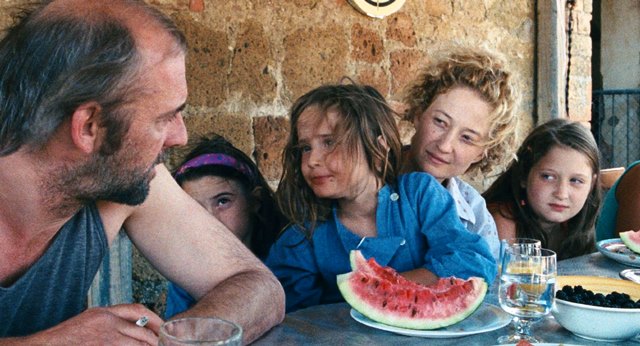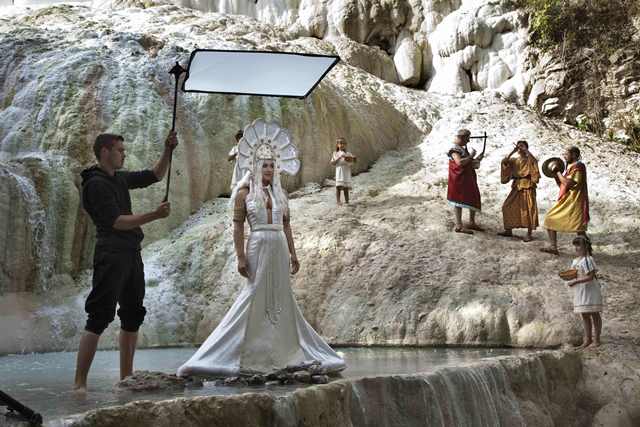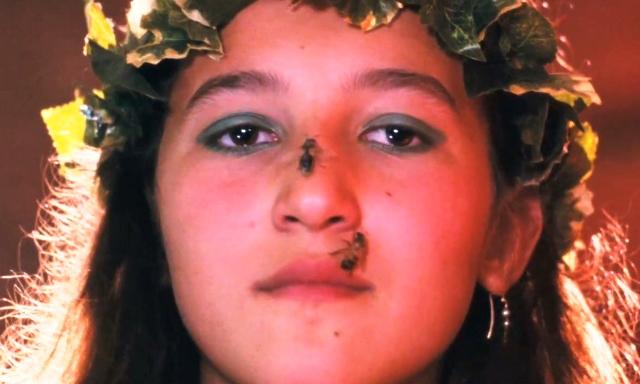Somewhere in rural Italy around the border of Umbria-Lazio and Tuscany, a family is trying to make the best of trying circumstances. Their mainstay is the production of honey. They have sheep. There are blackberries on their land. But money is short. Despite the fact that her irascible German father Wolfgang is seemingly in charge, it’s actually 12-year-old Gelsomina who runs the show. The Wonders is told from her point of view: the perspective of a child with three younger sisters forced to grow up and take on responsibilities for which she has no training. Gelsomina has to deal with what life has given her.
The Wonders (Le Meraviglie) is the second feature from the Tuscan-born director Alice Rohrwacher, whose father is German and mother Italian. She has worked with bees: her father was a beekeeper. Her sister appears in the film. Yet Rohrwacher has said her new film is not autobiographical, but instead an exploration of a world she grew up with and knows.
 Following her debut feature Corpo Celeste with another film centring on a young girl navigating the adult world initially suggests Rohrwacher could be a one-trick director, but The Wonders is more affecting, more ambitious and more rounded than its predecessor. Where that film’s similarly 12-year-old Marta prepared for her first communion, Gelsomina is preparing for all that life can bring. At Cannes 2014, The Wonders was awarded the Grand Prix.
Following her debut feature Corpo Celeste with another film centring on a young girl navigating the adult world initially suggests Rohrwacher could be a one-trick director, but The Wonders is more affecting, more ambitious and more rounded than its predecessor. Where that film’s similarly 12-year-old Marta prepared for her first communion, Gelsomina is preparing for all that life can bring. At Cannes 2014, The Wonders was awarded the Grand Prix.
As well as her three younger sisters, Gelsomina (radiant first-time actor Maria Alexandra Lungu) and her troubled father Wolfgang (Sam Louwyck, pictured above, left), the isolated farmstead is home for her French mother Alba (Alba Rohrwacher, above, second right) and Cocò (Sabine Timoteo), who helps with day-to-day tasks but is not a relative. There is no explanation of why they are all there, but the muilti-lingual band are perhaps urban transplants: maybe the remnants of some hippy style group-living experiment. The film could be set any time in the last 30 years. Nothing digital is seen and there are no mobile phones.
 Wolfgang, despite his volcanic temper and witheringly critical interpositions, does have a bond with Gelsomina – more than that with his wife, who threatens to leave him. He is out of his depth. There is little-to-no money to be made. He decides to take in a 14-year-old German delinquent boy as there is a monthly stipend. Gelsomina though has another idea about how to get some money. Without telling her father, she signs the family up for a crass and surreal television competition called Countryside Wonders, where a jury awards cash and the prize of a cruise to the Most Traditional Family.
Wolfgang, despite his volcanic temper and witheringly critical interpositions, does have a bond with Gelsomina – more than that with his wife, who threatens to leave him. He is out of his depth. There is little-to-no money to be made. He decides to take in a 14-year-old German delinquent boy as there is a monthly stipend. Gelsomina though has another idea about how to get some money. Without telling her father, she signs the family up for a crass and surreal television competition called Countryside Wonders, where a jury awards cash and the prize of a cruise to the Most Traditional Family.
Gelsomina and her sisters first come across the programme and its host, the fairy like Milly (Monica Bellucci), while an ad for it is being filmed (pictured above). The set-up is fantastic and Fellini-esque, as is the programme itself. Wolfgang is furious they have been entered but nonetheless goes along with it. In faux-Etruscan garb, he says “the world is about to end.” From his perspective, it probably is: pesticides from a neighbouring farm have killed the bees; EU regulations means the honey processing facility has to be rebuilt – they cannot afford to do so. Their way of life is threatened. The film ends with the family huddled on a mattress outside their house.
The Wonders speaks of harsh rural lifestyles and how they have become fodder for marketing tourism. It also looks at family bonds and the nature of growing up prematurely. Charming and poignant, it is an ode to loss – both of culture and youth. Gelsomina and her family will remain clinging together. But their future is uncertain. Recommended.
Overleaf: watch the trailer for The Wonders
Watch the trailer for The Wonders















Add comment